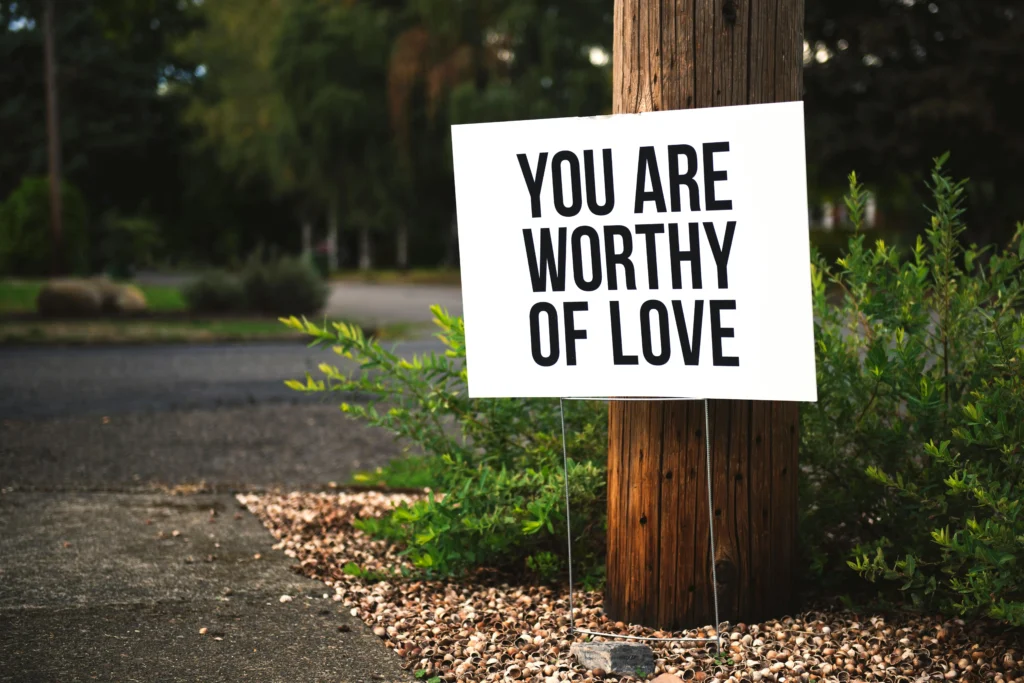The Power of Self-Love Affirmations: A Guide to Transforming Your Life

In the journey toward personal growth and happiness, self-love affirmations can be a powerful tool. But what exactly are affirmations, and why is self-love so important? In this blog post, we’ll explore these questions, provide practical tips on using affirmations effectively, and explain why working with a life coach and energy healer can enhance your self-love journey. What Are Affirmations? Affirmations are positive statements that you repeat to yourself regularly. They are designed to challenge and overcome negative thoughts and self-doubt. By consistently practicing affirmations, you can reprogram your subconscious mind to adopt a more positive and empowering mindset. Why Is Self-Love Important? Self-love is the foundation of a healthy and fulfilling life. When you love and accept yourself, you build resilience against life’s challenges, improve your mental and emotional well-being, and create healthier relationships with others. Self-love allows you to recognize your worth, set boundaries, reduce anxiety, and pursue your goals with confidence. How to Do Affirmations Right Be Specific and Positive: Affirmations should be clear, concise, and stated in a positive manner. For example, instead of saying “I am not a failure,” say “I am successful in everything I do.” Use the Present Tense: Frame your affirmations as if they are already true. This helps your subconscious mind accept them as reality. For example, say “I am confident and strong” rather than “I will be confident and strong.” Repeat Regularly: Consistency is key. Repeat your affirmations daily, preferably in front of a mirror, to reinforce their impact. How Not to Do Affirmations Avoid Negative Language: Affirmations should always be positive. Avoid using words like “not” or “never.” Don’t Be Unrealistic: While affirmations should be aspirational, they should also be believable. Overly unrealistic affirmations can lead to frustration and disappointment. Lack of Emotion: Affirmations should be said with feeling. Simply reciting them without emotion will not have the same impact. Famous People Who Use Affirmations Many successful individuals attribute their achievements to the practice of affirmations. Here are a few notable examples: Oprah Winfrey: Known for her positive outlook, Oprah regularly uses affirmations to stay focused and motivated. Will Smith: The actor and musician uses affirmations to maintain his confidence and drive. Jim Carrey: The comedian and actor famously used affirmations and visualization to achieve his career goals. Top 100 Self-Love Affirmations Here are 100 self-love affirmations to help boost your confidence and promote positive thinking: 1. I am worthy of love and respect. 2. I deserve happiness and joy. 3. I am enough just as I am. 4. I love and accept myself unconditionally. 5. I am proud of who I am. 6. I am confident and strong. 7. I believe in myself and my abilities. 8. I am deserving of all good things. 9. I am grateful for my unique qualities. 10. I trust myself and my decisions. 11. I am a valuable and important person. 12. I am kind and compassionate to myself. 13. I am worthy of all the love and happiness in the world. 14. I honor my boundaries and prioritize self-care. 15. I forgive myself for past mistakes and learn from them. 16. I am in control of my own happiness. 17. I am deserving of success and abundance. 18. I am beautiful inside and out. 19. I choose to focus on my strengths. 20. I am resilient and can handle anything that comes my way. 21. I am deserving of rest and relaxation. 22. I am open to receiving love and kindness. 23. I am proud of my accomplishments. 24. I am a positive and radiant person. 25. I am grateful for my body and all it does for me. 26. I am worthy of taking up space. 27. I am enough, just as I am. 28. I am at peace with who I am. 29. I am deserving of healthy and loving relationships. 30. I am a work in progress, and that’s okay. 31. I choose to see the good in myself and others. 32. I am deserving of my dreams and aspirations. 33. I am a source of light and love. 34. I am worthy of being heard and seen. 35. I am a unique and valuable individual. 36. I embrace my imperfections and see them as strengths. 37. I am capable of achieving great things. 38. I am a loving and caring person. 39. I am worthy of respect and kindness. 40. I am enough, and I have enough. 41. I am deserving of self-compassion. 42. I am proud of how far I’ve come. 43. I am a beautiful person, inside and out. 44. I am confident in my abilities and talents. 45. I am deserving of love, joy, and happiness. 46. I am kind to myself and others. 47. I am grateful for my life and the people in it. 48. I am a positive influence on others. 49. I am capable of creating a life I love. 50. I am deserving of self-care and self-love. 51. I am proud of my uniqueness. 52. I am worthy of all the good things that come my way. 53. I am enough, just as I am right now. 54. I am a strong and capable person. 55. I am deserving of peace and tranquility. 56. I am grateful for my journey and the lessons it has taught me. 57. I am confident in who I am. 58. I am worthy of being happy. 59. I am a loving and kind person. 60. I am deserving of success and prosperity. 61. I am proud of my growth and progress. 62. I am enough, and I am worthy of love. 63. I am capable of achieving my goals. 64. I am deserving of respect and admiration. 65. I am grateful for my strengths and abilities. 66. I am a unique and valuable person. 67. I am confident in my own skin. 68. I am deserving of joy and laughter. 69. I am a positive and inspiring person. 70. I am worthy
Rebuilding Self-Confidence After a Breakup: Steps to Rediscover Your Worth

Going through a breakup can be one of the most challenging experiences in life. Whether the split was amicable or filled with conflict, the aftermath often leaves us feeling shattered and questioning our self-worth. It’s natural to experience a dip in self-confidence during this time, but it’s essential to remember that this is just a phase – one that you can overcome with patience, self-compassion, and dedication to your personal growth journey. Understanding the Impact of a Breakup on Self-Confidence The end of a relationship can leave us feeling emotionally drained and insecure. We may find ourselves replaying past conversations and actions, searching for clues as to what went wrong or blaming ourselves for the outcome. These negative thought patterns can take a toll on our self-esteem, making it difficult to move forward with confidence. It’s crucial to recognize that our self-worth is not determined by the success or failure of a relationship. Instead, it stems from within – from our inherent value as individuals. While a breakup may shake our sense of self temporarily, it does not define who we are or diminish our worthiness of love and happiness. Steps to Rebuild Self-Confidence 1. Practice Self-Compassion: In the aftermath of a breakup, it’s easy to be hard on yourself. Instead of berating yourself for perceived mistakes or shortcomings, practice self-compassion. Treat yourself with the same kindness and understanding that you would offer to a friend in a similar situation. Remember that it’s okay to feel sad, angry, or lost – these emotions are part of the healing process. 2. Seek Support: Reach out to friends, family members, or a therapist who can offer support and perspective during this challenging time. Talking about your feelings with someone you trust can help you gain clarity and validation. Additionally, consider seeking professional guidance from a life coach or therapist who specializes in relationship issues and emotional healing. Mindset coaching can be particularly beneficial for reframing negative thought patterns and fostering a positive outlook on life. 3. Heal Emotional Trauma: Breakups often unearth deep-seated emotional wounds that require healing. Emotional trauma from past experiences can resurface, intensifying the pain of the breakup. Working with a practitioner who specializes in emotional trauma healing techniques such as Reiki, EFT (Emotional Freedom Technique), or soul retrieval can facilitate the release of trapped emotions and promote emotional healing. 4. Nurture Your Spirit: Reconnect with activities and practices that nourish your spirit and bring you joy. Whether it’s spending time in nature, practicing meditation, or engaging in creative pursuits, prioritize activities that uplift and energize you. Cultivating a sense of inner peace and fulfillment will naturally boost your self-confidence and resilience. 5. Practice Self-Care: Take care of your physical, emotional, and mental well-being by prioritizing self-care practices. Make time for rest, exercise, nutritious meals, and activities that help you relax and recharge. Prioritize sleep and establish a bedtime routine that promotes restful sleep. Engage in activities that promote self-expression and self-discovery, such as journaling, art, or music. 6. Challenge Negative Beliefs: Identify and challenge any negative beliefs or self-limiting beliefs that may be holding you back. Replace them with positive affirmations that affirm your worth and potential. Positive affirmations can rewire your mindset and boost your self-confidence over time. 7. Set Boundaries: Establish healthy boundaries in your relationships to protect your emotional well-being. Recognize and honor your needs and preferences, and communicate them assertively to others. Surround yourself with people who uplift and support you, and distance yourself from those who drain your energy or undermine your self-esteem. 8. Focus on Personal Growth: View this period of transition as an opportunity for personal growth and self-discovery. Embrace new experiences, hobbies, and interests that expand your horizons and challenge you to step out of your comfort zone. Invest in your personal development by setting goals and taking actionable steps towards achieving them. 9. Forgive Yourself and Others: Release any lingering resentment or bitterness towards yourself or your ex-partner by practicing forgiveness. Forgiveness does not mean condoning hurtful behavior or forgetting past grievances. Instead, it’s about freeing yourself from the burden of resentment and reclaiming your power to choose peace and liberation. 10. Celebrate Your Progress: Acknowledge and celebrate your progress, no matter how small it may seem. Every step forward, no matter how insignificant it may appear, brings you closer to healing and growth. Reflect on your accomplishments and resilience, and recognize the strength and courage it takes to rebuild your self-confidence after a breakup. Conclusion Rebuilding self-confidence after a breakup is a gradual process that requires patience, self-compassion, and dedication. By practicing self-care, seeking support, and engaging in healing practices, you can rediscover your worth and emerge from this experience stronger and more resilient than ever before. Remember, you are deserving of love, happiness, and fulfillment – both within yourself and in your future relationships. If you’re struggling to rebuild your self-confidence after a breakup and would like personalized support and guidance, consider working with a life coach and energy healer. Daniel Rosenstein, the Ultimate Energy Coach, specializes in empowering individuals to overcome challenges, heal emotional wounds, and live authentically. Take the first step towards reclaiming your self-confidence and schedule a consultation today. Together, we can embark on a journey of self-discovery, healing, and transformation. Your worthiness is inherent – it’s time to embrace it fully and step into the life you deserve. Contact Daniel Rosenstein, Life Coach and Energy Healer here
